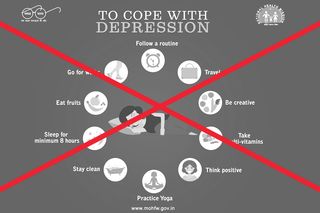
Health Ministry Attempts to Destigmatize Depression, Fails Miserably
Thankfully, India’s mental health community was there to call them out.

Yesterday, the Ministry of Health tweeted an extraordinarily obtuse and irresponsible poster about depression. The graphic, ostensibly an attempt to destigmatize mental health problems, normalize depression, and encourage people to be proactive about their mental health, sadly, did none of those things. It was at best a missed opportunity, and at worst, a misleading piece of misinformation that further entrenches stigma for an already deeply misunderstood condition.
The tweet encourages people with depression to “take up activities” in order to cope with depression. It features an illustration of a woman, laying in the fetal position, with a single tear dripping from the corner of her eye. Around her are various icons with suggested activities that will help her “cope.” The complete list: Sleep for minimum 8 hours, Eat fruits, Go for walks, Follow a routine, Travel, Be creative (complete with an illustration of a painter’s palette), Take multi-vitamins, Think positive, Practice yoga, and finally, Stay clean.
It’s hard to know where to start explaining what’s wrong with almost every single one of these tips. With the exception of getting enough sleep and being physically active, the rest of the pointers have absolutely no scientifically proven impact on clinical depression. Instead, they are a series of general wellness pointers, more appropriate for a personal wellness blog than a government health ministry’s messaging about a major public health problem. The very obvious irony, of course, is that a person with clinical depression struggles specifically with self-care; getting sound sleep, maintaining a routine, exercising regularly, eating healthfully, and thinking positively are precisely the things that they can’t do, specifically because of the condition.
Second, taken as a whole, these tips seem to indicate that clinical depression is a lifestyle choice, rather than a medical condition that requires treatment. In fact, clinical depression can stem from chemical imbalances in the brain, which are completely out of a person’s control, and from extreme situational stress, which alter a person’s normal cognitive coping mechanisms. All underlying reasons for depression are serious, complicated, and certainly not resolved by multi-vitamins, or (most perplexingly) travel. They are also not conditions that people can simply will away, by following a few simple steps.
In fact, one of the deepest and most harmful misunderstandings about depression is that it is something that can easily be brushed aside if only the person tries; in fact, in India, it’s often seen as a personal weakness, almost, that can be ignored, or shamed, beaten, and forced out of someone. Popular understanding of mental health disorders in India does not place such conditions on par with physical health. The GOI Ministry of Health’s twitter account should serve as a communication tool to change that.
In a country where mental health is so deeply misunderstood, and therefore heavily stigmatized, the government has a responsibility to provide clear, consistent, and accurate messaging to the public. This graphic was none of those things. It certainly begs the question of who within the Health Ministry bureaucracy is responsible for vetting and fact-checking these communications. From this particular tweet, it would appear to be a social media intern with no health care training.
Luckily for the Twitter-savvy public, mental health professionals pounced on this gaffe with aplomb. They tore it apart, noting, in particular, the very apparent fact that no credentialed mental health professional could possibly have been consulted on this tweet. So in this instance, the power of the Twitter mob will hopefully be an agent of change for the better understanding of the public at large. India’s mental health community has spoken, and they want a re-do.
Related


Delhi HC Rules It Is ‘The Duty Of The Husband’ To Pay Maintenance to Wife, Child
